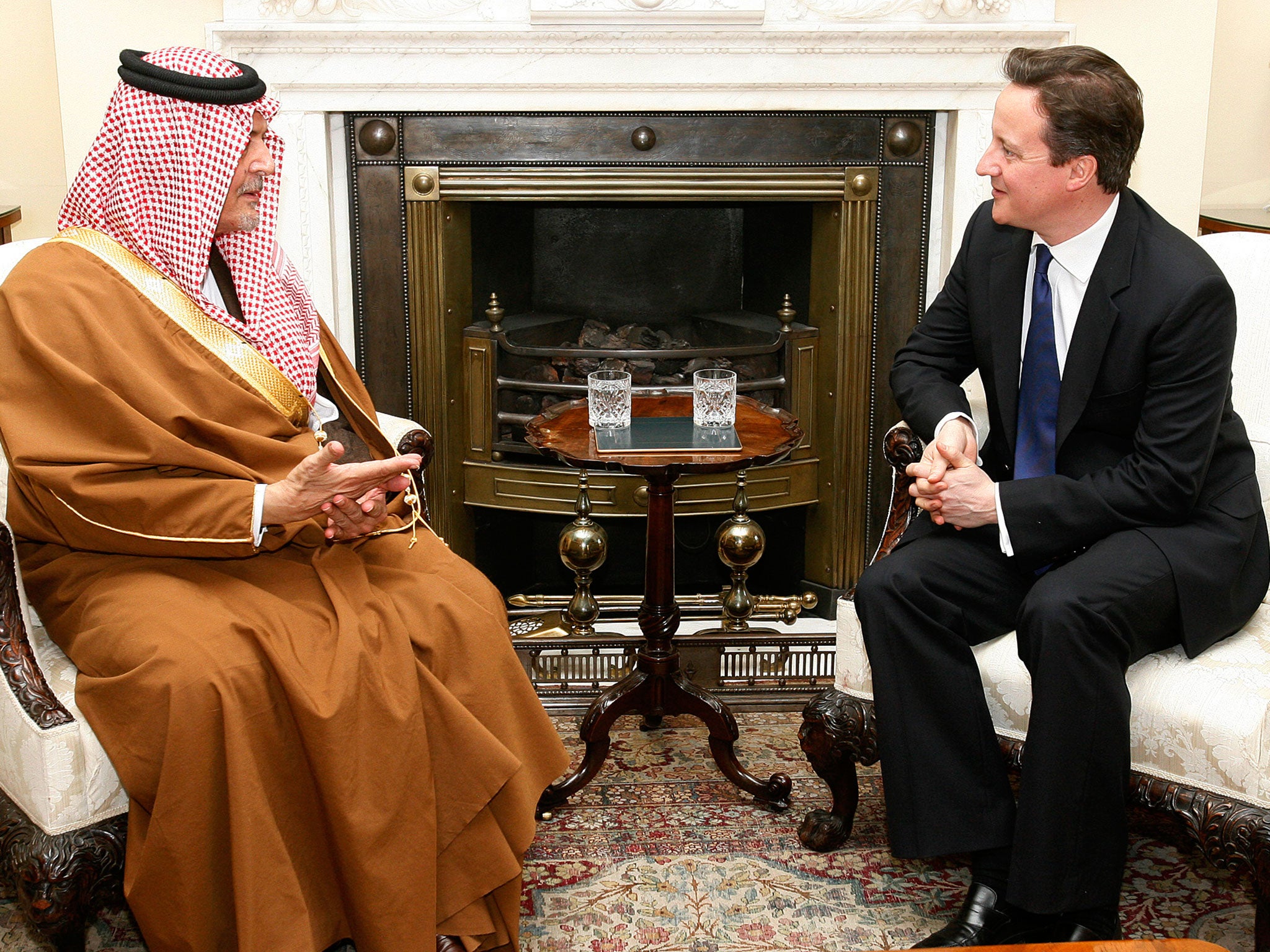David Cameron defends Britain's alliance with Saudi Arabia and rejects accusations it funds Isis
Jeremy Corbyn has criticised the UK's alliance with the oil-rich autocracy in recent months

Your support helps us to tell the story
From reproductive rights to climate change to Big Tech, The Independent is on the ground when the story is developing. Whether it's investigating the financials of Elon Musk's pro-Trump PAC or producing our latest documentary, 'The A Word', which shines a light on the American women fighting for reproductive rights, we know how important it is to parse out the facts from the messaging.
At such a critical moment in US history, we need reporters on the ground. Your donation allows us to keep sending journalists to speak to both sides of the story.
The Independent is trusted by Americans across the entire political spectrum. And unlike many other quality news outlets, we choose not to lock Americans out of our reporting and analysis with paywalls. We believe quality journalism should be available to everyone, paid for by those who can afford it.
Your support makes all the difference.David Cameron has defended Britain’s alliance with Saudi Arabia, including British assistance to the country’s widely-criticised military campaign Yemen.
The Prime Minister said the UK’s alliance with the oil-rich autocracy was important for its security and seemed to reject accusations that funding for Isis came from the Kingdom.
The Saudi Arabian ambassador Prince Mohammed bin Nawaf bin Abdulaziz al Saud attacked Labour leader Jeremy Corbyn last month for raising the allegations, describing them as a “distortion”.
But Mr Cameron stood by his ally and defended exports and military advisor support given to the country during its ongoing war.
“First of all, our relationship with Saudi Arabia is important for our own security. They are opponents of Daesh and the extremism [they spread],” he told BBC Radio 4’s Today programme.
“In terms of our arms exports I think we have some of the most stringent controls anywhere in the world and I’ll always make sure they’re properly operated.
“We’re trying to do everything we can to make sure that the work done by Saudi Arabia is properly targeted and it’s right that we should do that. We’re working with them and others on behalf of the legitimate government on Yemen.”
Mr Cameron however said some educational training programmes funding by Saudi Arabia could be problematic, though he did not directly link them with extremists.
A number of human rights groups have warned that the country’s intervention in Yemen is likely to have breached human rights laws. The United Nations said late last year that a “humanitarian disaster” was unfolding in Yemen.
In December Human Rights Watch said the assault, which is in support of the internationally recognise Government against Houthi rebels, had killed 5,884 since March.
Multiple hospitals operated by the charity MSF have been bombed, that charity has said.
Mr Cameron’s praise for the autocracy comes days after Saudi Arabia’s foreign minister Adel al-Jubeir urged Britain to “respect” his country’s use of the death penalty.
He told Channel 4 News: “With regards to the perception of Saudi Arabia among the British public, this is a problem we need to work on.
“We have not been good at explaining ourselves, we have not done a good job at reaching out to the British media or to the British public or to the British institutions, academic institutions, think thanks and so forth.
Two week ago the oil-rich kingdom executed 47 people in one day; most executions in the country are conducted by beheading.
The issue of the UK’s alliance with the country has come to the fore in recent months. In October the British Ministry of Justice cancelled a contract to run the Saudi prison system after pressure from Cabinet ministers and Mr Corbyn.
Previous stands taken against the Saudi Arabian regime have not gone the UK’s way, however.
High Court documents released in 2008 alleged that an investigation by the Serious Fraud Office into Saudi Arabia was dropped because of threats by the kingdom to stop sharing intelligence on terror plots.
The files said the UK was told it faced “another 7/7” and the loss of “British lives on British streets” if intelligence was cut off.
Downing Street blocked the investigation from continuing, the Guardian newspaper reported at the time.
Despite the about-face on the prisons contract, the UK still sells billions of pounds worth of arms to Saudi Arabia.
Between May 2010 and May 2015 the Coalition government licenced almost £4bn in arms to the regime, according to figures obtained by the Campaign Against the Arms Trade.
62 per cent of the public oppose arms sales to Saudi Arabia, with only 16 per cent supporting them, according to a poll conducted by Opinium for that campaign group.
Join our commenting forum
Join thought-provoking conversations, follow other Independent readers and see their replies
Comments